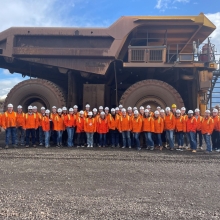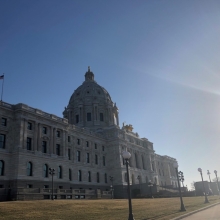Governor Walz on UI Trust Fund fix, legalized cannabis and more
Where does Governor Walz stand on top business issues?
Unemployment Insurance Trust Fund fix
Tom Hauser: The unemployed insurance trust fund, will you support spending $2.7 billion to refill it so that there will be no tax increase on business?
Governor Walz: That was my proposal...And you know how this works, it pays it back to even, and then you have to pay it back above so that you're not paying in on that tax it's federal rules. They're not going to waive them. And I think telling the average Minnesotan, this incredibly important anti-poverty program that was there when we needed it, and you know how all this works. Every one of those dollars that went into that unemployment insurance went back out again to buy products you make, to pay rent that you collect, to do those things that families needed to live...I know that there's the school of thought that says, "Well, you gave away something that we should negotiate with." We all want this. We all want this across the board. I don't think we should view everything, "These are my things, I've got to negotiate to take these from you." I believe it was the worker's priority. I believe it was the Chamber's priority. I believe it's fiscally responsible. Why would we pay increased taxes and pay interest to the federal government when we have the money here? That doesn't make sense.
Proposed paid leave mandates
Tom Hauser: Lot of businesses in here are concerned about I know the House DFL has a proposal for this. I think you've been in favor of it. Paid family leave that many in the business community think will eventually end up being a defacto tax on them. Your thoughts on whether paid family leave will pass this year.
Governor Walz: I know there's folks out here in the human resources, folks are telling this competition for workers is hard. Many of the companies sitting here already offer that. It's more difficult for smaller employers to offer that. I do think when we're talking about paid family, leave about protecting workers about being there, both the moral side of that someone should be home with a sick child when they need to, or if they need the time off. Let's all just be really honest about this, that every other industrialized nation has this. There's only a handful of nations in the entire world of the 206 or whatever that don't do this. I'm sensitive to this idea that this would be the payroll tax much like the UI, what that would come back. But I would argue in this labor market where people are at and keeping and retaining workers, your HR people will tell you this turnover in retraining people trying to get them is super expensive. In every one of these countries and states that have done this, they've seen less turnover and more loyalty back to those companies. I'm open to talking about this. Workers want this, they're looking for companies that offer it. It seems like it improves quality of life across the board. I think we should have a conversation about it.
Returning the surplus via "Walz Checks"
Tom Hauser: Let's talk about the "Walz Checks." First of all how hard are you going to fight to make them part of any final budget solution? And are you open to across-the-board income tax cuts as Senate Republicans are talking about as well as eliminating the tax on Social Security.
Governor Walz: What we've got to tax proposals in here to reduce the cost, especially around child care with the child care credit expiring at the federal level...We do have some permanent reductions in there. We've worked on whether it was 179, some of the conformities we did, property taxes for businesses. I think these checks are important now because the fact of the matter is there's a whole lot of people who just talked about some prices went up, even if their incomes went up a little bit, puts the money into their hands. If you own a business from a furniture store to a consulting, whatever it may be, tax preparation, folks are going take those checks and spend them again. They work at a time that we need to make sure we don't have a slowdown in the economy.
Workforce development
Tom Hauser: What is the single thing you think that maybe you could do in concert with the Legislature to help all of these folks find workers?
Governor Walz: Start by listening to them. That is what we've done. I think the model on these CNAs, we went out there. We said, we have a shortage of CNAs. We put the National Guard to backfill. We did this in December. We said, by the end January, we wanted to recruit a thousand folks off the streets. We went through the roles we saw, who's collecting unemployment, who took some training and didn't finish, who might want to do this. We went out and made calls to folks and said, would you like to do this? I think whether it's trucking, whether it's some of these other things, we can do that triage in the short term, but I'll tell you, the biggest thing we can do is we need people to be positive about this state. I'm not asking for us to push our shortcomings under the rug. I'm not saying we're not challenged on many things that we need to deal with and should deal with. But if we sell this state for the greatness as it is, people wanting to move here, watching us work together, that's why families want to relocate. My mantra when I ran for governor, I want to make this the best state in the country to raise a child and have a family. That's what draws workers.
Addressing public safety concerns
Tom Hauser: Public safety is an economic development issue if businesses don't think they keep their workers safe. What do you plan to do? What's your number one priority to fight crime in Minnesota?
Governor Walz: First and foremost, safety is a top priority. We deserve that. The citizens of Minnesota should demand it. It is not mutually exclusive. We should also deserve a justice system that does justice the way that we know it should be done. I would argue some of the things we can do, get the resources into the hands. If communities need to hire, get them the money to hire, Let communities adjust what they need to do. Make sure we have a statewide violent task force. We have resources at BCA to help. Local police are in charge of this, but this is about coordinating across districts. We become siloed up and we can do better. If you listen to the police chiefs, if you listen to the folks on the ground, there's a golden opportunity.
Legalizing cannabis
Tom Hauser: Legalizing cannabis, any chance that happens this year cannabis given that the Senate remains opposed?
Governor Walz: I hope so...It makes sense to me that we should regulate what those products are. We should have a taxation system that's put in place and we should make sure, then I don't want police on cannabis crimes when we have carjackings. We have a limited set of resources and we should focus where it is. I think it makes sense. And there's an equity piece to this. There is simply an equity piece. We have a large number of people who have been hit by this, especially in communities of color that I think we could take that off.
Legalizing sports betting
Tom Hauser: A lot of those arguments in favor of legalizing cannabis are the same arguments for legalizing sports betting. Will you support sports betting? Would you sign a bill if it came to your desk?
Governor Walz: I'm certainly open to it. I trust adults to make their own decisions. As we look at the expansion of gambling, we have a system that works well in Minnesota. There's a lot of players that have to be a part of this. I certainly am willing to have that conversation, but I would tell you this too much like cannabis, I go into this eyes wide open. There's a societal cost that goes with these things, but there's also the idea that as a society, we can trust adults to make their good decisions as long as you're doing all we can to protect children, others from that. So I'm open to that conversation, but we've go to work with our partners in our tribal nations, our sovereign nations signed a compact. They expect us to honor what we've done with that. And I think they're going to be a key piece of this.


